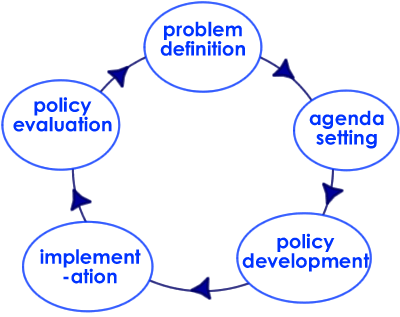

at the 4th International Conference on Electronic Democracy, Centre for E-Government, Danube-University Krems, Austria:
http://donau-uni.ac.at/edem
Conference program (pdf)
Organisers; Ella Taylor-Smith (Edinburgh Napier University) and Ralf Lindner (Fraunhofer ISI)
Contact: e.taylor-smith@napier.ac.uk or Ralf.Lindner@isi.fraunhofer.de
This workshop follows on from Social Networking Tools and Widgets to Promote or Expand eParticipation Initiatives held at eDem 09.
The focus for our 2010 workshop is on using SN tools, specifically to support involvement (rather than enabling involvement through publicity).

We want to find out what kinds of tools are supporting involvement at which stages in the policy cycle
For a brief overview over the policy cycle framework see W. Jann/K. Wegrich (2007): "Theories of the Policy Cycle", in: F. Fischer/G.J. Miller/M.S. Sidney (eds.): Handbook of Public Policy Analysis, Boca Raton, p. 43-62.
In order to work out how the SN tools fit into the policy-making process, we are asking participants to categorise the tools in advance, using a framework we have prepared and distributed as a spreadsheet (reproduced as a table below). The framework includes four criteria which aim to define the tools' interface with the policy-making process:
The criteria "How do policy-makers respond" aims to identify interaction tools used at this end of the eParticipation process. We are interested to see whether and how SN tools are being used to gather inputs or feedback from government or elected members, as well as inputs from citizens.
SN tools and initiatives that have been entered into the framework in advance of the workshop will be mapped to graphics. Other tools and initiatives will be added during the workshop (or perhaps during the conference in advance of the workshop). This will begin to give us a picture of how eParticipation initiatives aim to have impact on public policies. In addition, it will shed light on how SN tools are used within eParticipation initiatives and what advantages they bring over/add to other eParticipation tools like structured discussion forums. Do they bring identifiable benefits or are they merely being used as the current interaction trend?
In addition to mapping the tools using the framework, a selection of tools will be presented as more detailed case studies, in order to furnish examples for discussion.
| Project name/ URL | Tool/ widget type or brand | Citizen target | Policy-making target (type and level) | Policy cycle stage | How do policy-makers respond? | How do you measure its impact? | Problems so far |
|---|---|---|---|---|---|---|---|
| e.g. RSS feed, Bebo | e.g. Young people, local people, people who use a specific service | e.g. Parliamentary Committee, Minister (National or EU), Local council |
|
e.g. using the same SN tool, provide text for response page, no method provided | e.g. usage statistics, feedback from users, change in policy. |
Are you coming to EDem10? Would you like to take an active part in our workshop? Get in touch -it's not too late
The policy cycle framework presents a simplified and ideal-type model of the policy process; it is nevertheless useful to systemise and structure the highly complex processes of policy-making:
Additional SN sites
Daniel Van Lerberghe, from the Politech Institute demonstrated the use of SN tools
by the council of Issy Les Moulineaux, Paris: http://www.issy.com/
and especially http://www.i-folio.fr/. These sites demonstrated an ease
and familiarity with the basics of Social Networking and real integration with the business of the council.
Discussion
The case studies and workshop themes provoked a lively discussion.
Participants did not agree that lack of specific engagement with the policy -cycle indicates that eParticipation has
no real influence -though it was acknowledged that the intersection of eParticipation/eDemocracy initiatives with
legislative power was problematic. There is no agreed democratic model for this.
Neither did participants agree with the discussion statement SN tools have no advantage over any other form
of interaction -they're just the trendy thing to use...Participants felt that the popularity
of SN tools made them a useful component of eParticipation. The challenges are:
Feedback about the EDem10 Conference hosted last week at the Danube University in Krems, reviews as well as presentations, our keynotes (Stevan Harnad, Ismael Peña-López, Micah Sifry and Andy Williamson) answering 5 questions about e-democracy and the #edem10 tweets is now available at http://digitalgovernment.wordpress.com/tag/edem10/
This workshop is being run by the HUWY project. We intend to use the information gained in our dissemination strategy.
The HuWY project aims to get young people talking about policies and laws which affect the Internet and channel this to people in governments and parliaments, working on these policies. Young people choose the topics and questions, host the discussions on their web pages and post the results on Hubs provided by the project. HuWY partners provide information and support and involve young people and youth groups. HuWY also organise people working on Internet policies to read and use the results. The online Hubs hold supporting information, space for the results of young people’s discussions and feedback from policy-makers.
![]() The HuWY project is sponsored by the European Commission under the eParticipation preparatory action.
The HuWY project is sponsored by the European Commission under the eParticipation preparatory action.